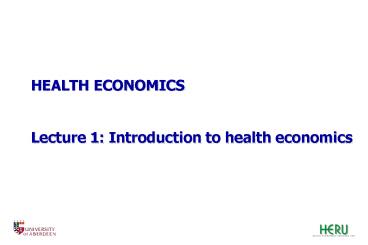HEALTH ECONOMICS Lecture 1: Introduction to health economics - PowerPoint PPT Presentation
1 / 20
Title:
HEALTH ECONOMICS Lecture 1: Introduction to health economics
Description:
To introduce you to the application of economic thinking to ... 1/3 of a cochlear implant. 1 heart bypass operation. 11 cataract removals. 150 MMR vaccinations ... – PowerPoint PPT presentation
Number of Views:10380
Avg rating:3.0/5.0
Title: HEALTH ECONOMICS Lecture 1: Introduction to health economics
1
HEALTH ECONOMICSLecture 1 Introduction to
health economics
2
Outline
- Course overview
- Group work - what is economics
- Brief lecture on some basic economic concepts
- Group work - priority setting exercise
3
Course aim
- To introduce you to the application of economic
thinking to the analysis of health policy and
health systems - Components
- Organisation and financing of health care
- Priority setting and resource allocation
- Economic evaluation of alternative ways of
providing health care
4
Course skills
- Ability to
- Describe the key theories underpinning health
economics - Explain the different ways in which health care
can be financed and delivered - Recognise the contribution of economics to health
and health care and how it can assist decision
making in the NHS - Demonstrate what economic evaluation is and its
underlying principles - Critically appraise published economic evaluations
5
Students
- BSc Health Sciences
- MSc in Health Services Research
- MSc in International Health and Management
- MBA International Health Care Management
6
What is economics?
- The study of how men and society end up
CHOOSING, with or - Without the use of money, to employ SCARCE
productive - RESOURCES that could have ALTERNATIVE uses, to
produce - various commodities and DISTRIBUTE them for
consumption, - now or in the future, among various people and
groups in - society. (Samuelson)
7
Why health economics?
- Rapid growth in health expenditure
- demographic changes
- technological advance
- changing expectations
- Resources available to health care are scarce
- Choices must be made as to what health care
should be provided, how it should be provided, in
what quantities and how it might be distributed
8
The role of health economics
- To provide
- a way of thinking
- a set of techniques
- To assist decision making, usually in the health
care sector, to - promote
- efficiency
- equity
- Economics is about maximising social benefits
subject to the - constraint imposed by resource availability
9
(No Transcript)
10
What is economics?
- The study of how men and society end up
CHOOSING, with or - Without the use of money, to employ SCARCE
productive - RESOURCES that could have ALTERNATIVE uses, to
produce - various commodities and DISTRIBUTE them for
consumption, - now or in the future, among various people and
groups in - society. (Samuelson)
11
What is economics?
- Economics is about allocating scarce resources
- Three fundamental elements
- scarcity needs, wants and demands are greater
than resources available to meet them - choosing analyses and assists decision making
- alternative uses opportunity costs
12
Scarcity
- Resources (land, labour, capital) are limited
- Therefore there is some maximum quantity of
health care that can be produced at any one time - Potential uses of those resources are unbounded
- No health care system has achieved levels of
spending sufficient to meet all wants for health
care - Choices must be made as to what health care
should be provided, how it should be provided, in
what quantities and how it might be distributed
13
Opportunity costs
- By choosing to use resources in one particular
way, other opportunities for using those
resources are foregone - The opportunity costs of committing resources to
produce a good or service is the benefits forgone
from those same resources not being used in their
next best alternative
14
Opportunity cost of IVF
- One course of IVF treatment is 2700. Three
courses of IVF - (_at_8100) increase probability of pregnancy by
30. Good - value for money?
- Opportunity costs? Benefits of
- 1/3 of a cochlear implant
- 1 heart bypass operation
- 11 cataract removals
- 150 MMR vaccinations
- 1/1000 of a challenger military tank
- 50 of a junior school teaching assistant for a
year - 2000 school dinners
15
Opportunity cost
- From a limited budget, the most efficient mix of
services to fund will be that which generates the
greatest aggregate benefit - The aim of economics is to ensure that we do
those activities whose benefits outweigh their
opportunity cost (i.e. we do the most beneficial
things with the resources at our disposal)
16
Margin
- Often question is not whether or not to provide a
service - But whether to increase or decrease the number of
services - Marginal analysis
- Study of consequences of small changes in a
variable or variables
17
Screening for cancer of the colon
- Stool is tested for the presence of occult blood
- Proposal was for six sequential tests
- Neuhauser and Lewicki analyzed the proposal
assuming - a population of 10,000 of whom 72 have colonic
cancer - each test detects 91.67 per cent of cases
undetected by the previous test
18
Cases detected
19
Costs of 6 sequential tests
20
Incremental/marginal costs































